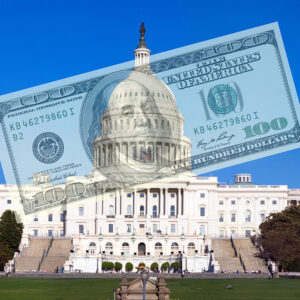Business leaders watching the situation in Washington might be tempted to disengage from the policy process. Given the partisan gridlock, political dysfunction and seemingly endless crises, why should they bother?
The frustration is understandable, but withdrawing would be a big mistake.
Political conditions in Washington are stressed. However, important policy decisions are still being made and implemented by the legislative and executive branches. Policies that create jobs and economic growth don’t just happen. The business community must be engaged in the process.
The business community is one of the few parts of American life that continues to command significant public trust. According to the 2023 Edelman Trust Barometer, an annual global survey of the public’s faith in societal institutions, 55 percent of U.S. respondents say they have more trust in business than in government, which is trusted by only 42 percent of Americans surveyed.
Declining trust in the government, political leaders, the media and other institutions creates an opportunity for the business community to be a positive influence. That should start with telling a clear and compelling story about the business community’s role in creating economic growth and jobs.
This is a particularly important role given the mixed data we’re seeing in the economy. The monthly jobs reports and quarterly growth estimates have remained strong. Other dynamics undermine public confidence, such as rising interest rates, continued high inflation, and housing costs.
Business leaders advocate for pragmatic policies that will contribute to expanded business investment and more widespread prosperity. Specifically, that means:
—Combating punitive tax hikes. Business leaders should explain why Congress needs to extend the 2017 tax reforms to ensure continued investment and competitiveness.
—Making the case for global trade. While large-scale, overly complex trade agreements like the failed Trans-Pacific Partnership are a non-starter in today’s environment, business leaders can and should make the case for bilateral trade agreements with our trusted commercial partners to keep the economy moving.
—Reforming burdensome regulations. There’s an urgent need to address the crushing tangle of federal regulations that are strangling the free enterprise system, and business leaders are in a good position to make the case for regulatory reform.
The business community will need to navigate some important political dynamics in Washington. One is the evolution of the two-party system.
The Republican Party seeks to appeal more to working-class Americans and small-business owners. The GOP retains its traditional commitment to free enterprise and competitive markets.
The Democratic Party wants to see a more growth-oriented approach, and the business community should seek to identify and work with them.
While the business community enjoys a position of greater trust, that trust is an asset that can be easily lost. Care must be taken when engaging in sensitive political and cultural debates. While some companies might benefit from taking sides in hot-button debates, others can be seriously tarnished by clumsy forays into such debates. Companies and CEOs are well advised to weigh the risks of wandering into the minefield of polarizing issues. Focusing on job creation and creating shareholder value is a more constructive path.
In a time of polarization and dysfunction, business leaders should make the case for leadership, predictability and stability — all the components of competent governance Americans expect from their leaders. With one year until the 2024 elections, it’s time for business leaders to provide the needed direction and leadership to put the nation on a path to sustained recovery and growth.

